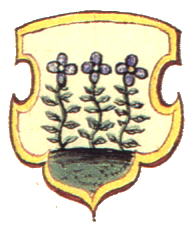Mannar: Difference between revisions
Jump to navigation
Jump to search
Knorrepoes (talk | contribs) m (Text replacement - ".jpg|center]] ====Official blazon====" to ".jpg|center|Arms of {{PAGENAME}}]] ====Official blazon====") |
Knorrepoes (talk | contribs) m (Text replacement - "====Origin/meaning====" to "===Origin/meaning===") |
||
| Line 11: | Line 11: | ||
====Official blazon==== | ====Official blazon==== | ||
===Origin/meaning=== | |||
The arms show the Indian Maddar plant, which was used to produce a bright red dye, an important export product in the 18<sup>th</sup> century. Mannar was known for its red textiles. | The arms show the Indian Maddar plant, which was used to produce a bright red dye, an important export product in the 18<sup>th</sup> century. Mannar was known for its red textiles. | ||
Revision as of 19:45, 22 June 2017
| Heraldry of the World Civic heraldry of Sri Lanka |
MANNAR
Official blazon
Origin/meaning
The arms show the Indian Maddar plant, which was used to produce a bright red dye, an important export product in the 18th century. Mannar was known for its red textiles.
The above image dates from a manuscript dating from 1717/1720. The town currently does not use arms.
Contact and Support
Partners:
Your logo here ?
Contact us
© since 1995, Heraldry of the World, Ralf Hartemink 
Index of the site
Literature : Silva, de and Beumer, Illustrations and views of Dutch Ceylon 1602-1796, 1988.











